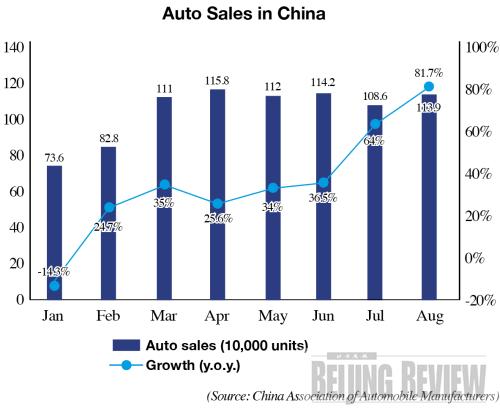| 
Numbers of the Week
4.3%
China's registered urban unemployment rate stood at 4.3 percent at the end of August, according to the Ministry of Human Resources and Social Security.
$183.9 billion
China's accumulated outbound direct investments have surpassed $183.9 billion, said Ma Kai, Secretary General of the State Council.
TO THE POINT: Chinese service outsourcing providers defy the economic downturn to put their resources into high gear. Private sector investments are also on the rise, boding well for a longer-term upturn in the broader economy. Restructuring in the steel-making industry abounds as the Shandong Iron and Steel Group agree to merge with the Rizhao Steel Holding Group Co. Ltd. The Ministry of Finance is set to float 6 billion yuan ($878 million) of renminbi sovereign bonds in Hong Kong to push forward internationalization of the Chinese currency. The World Bank upholds China's adherence to stimulative monetary and fiscal policies.
By HU YUE
Outsourcing Spring
After facing the deep economic gloom of the global financial crisis, prospects for many Chinese industries remain in the air. But viewing the current progress of service outsourcers would not allude to any signs of a cloudy industrial future.
The sector provided $2.56 billion worth of international outsourcing services from January to June, up by a robust 32.5 percent year on year, according to Lin Zheying, Deputy Director of the Foreign Investment Department under the Ministry of Commerce. The newly established providers in the first half numbered 1,400, Lin said.
Through the economic chaos, the outsourcers were able to find opportunity. To save costs and preserve cash, the crisis-stricken multinationals are increasingly spreading out their non-core businesses ranging from handling payrolls to running customer call centers. In addition, Chinese policy-makers have been offering incentives, including tax breaks and subsidies, to the industry in an effort to help grab more market shares.
Analysts contend China is in the process of encroaching on the foothold that India commands of the global outsourcing pie. The south Asian country's stronger English language skills and cheap labor may make it difficult for China to play catch-up, but China has its own advantages. It leverages a solid infrastructure basis and an ever-growing market that appeals to global investors. Wage inflation has eaten into Indian companies' margins and the multinationals are concerned that they have committed all their eggs to one basket.
China is also expanding its pool of highly qualified English-speaking personnel, smoothing its way toward becoming a global leader of service outsourcing, said Egidio Zarrell, an IT adviser and partner with the accounting firm Klynveld Peat Marwick Goerdeler, at a press conference.
The goal Chinese outsourcers need to strive for is a commitment to branding and market, which will help sharpen their competitive edge, he added.
Private Investing Revival
Massive government investment has provided a floor under which the Chinese economy can regain its footing in an attempt to fully rebound, but as economists look for assurance of sustainable growth, one problem looms large—the country simply can not keep the economy afloat on an endless supply of government money.
The current reliance on government money may soon be replaced with more positive financial news, as private investors appear to finally be making progress. Private urban investments in fixed assets from January to July grew a hefty 32.9 percent from the previous year, said Zhang Ping, Minister of the National Development and Reform Commission (NDRC), China's top economic planner. The number of private enterprises nationwide had totaled 6.92 million by the end of June, rising 5.3 percent year on year, he added.
| 